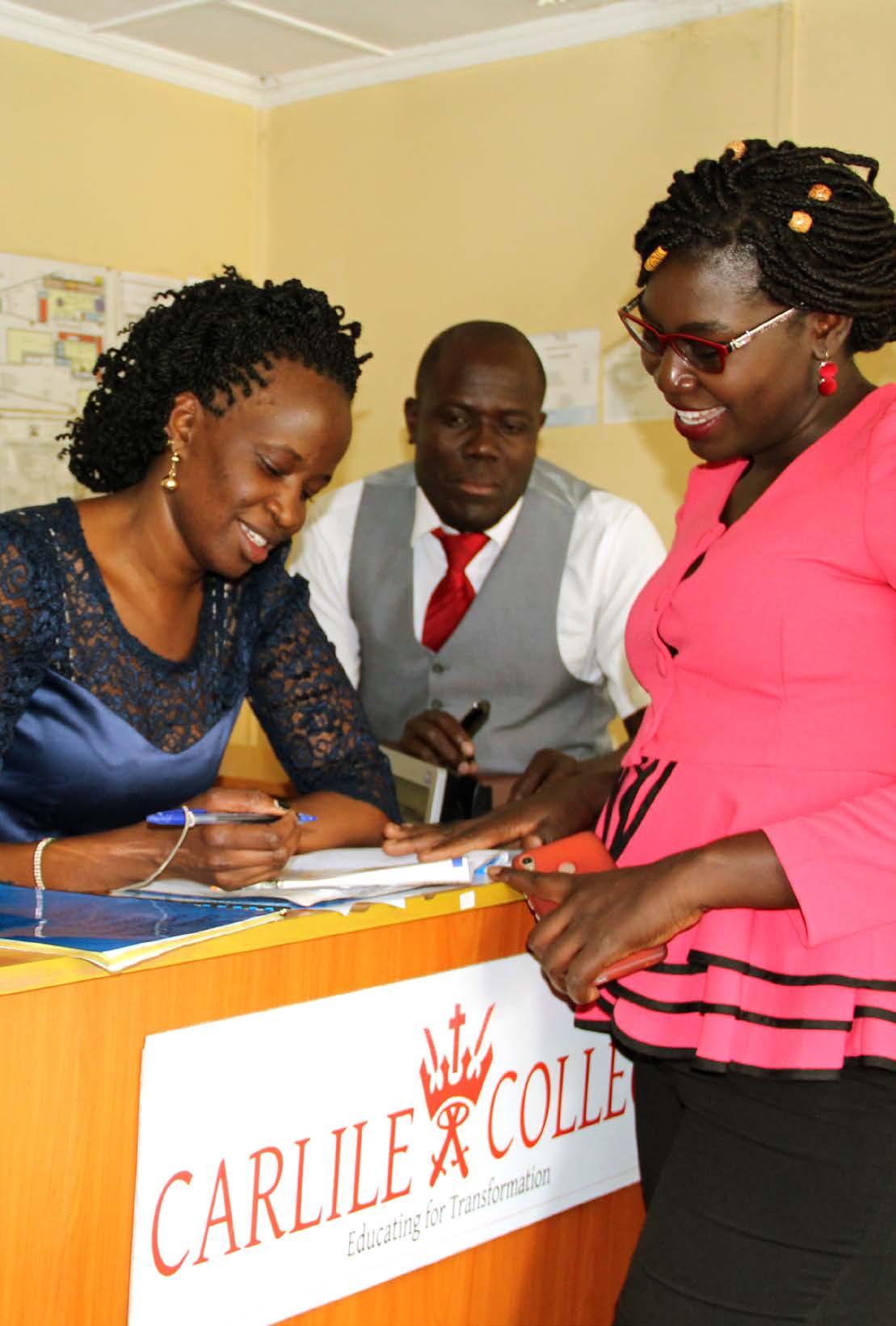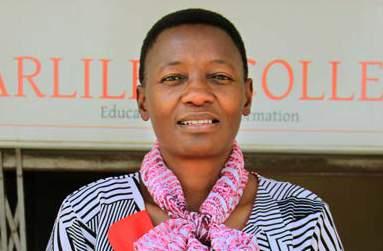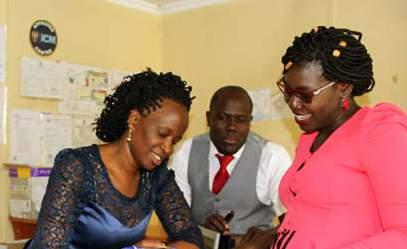
10 minute read
Nurturing a Healthy Church
by USPG
The Rev'd Capt Patience Santa Wanzala Credit: Carlile College

The Rev’d Capt Patience Wanzala, Principal of Carlile College, Nairobi, Kenya was to speak at the USPG Rethinking Mission Conference. What follows is an extract from what would have been her presentation.
Rethinking mission is a very challenging phrase because it suggests a situation where the church or Christians have forgotten or lost their passion, call and God-given mandate to reach out to the world, community and family with the message of reconciliation. (Paul in 2 Corinthians 5: 14-210). ‘God reconciled us to himself and gave us the ministry of reconciliation’. After his resurrection, Jesus met the eleven in Galilee at the mountain. After they had worshipped him, he told them “All authority in heaven and on earth has been given to me. Therefore, go and make disciples of all nations, baptizing them in the name of the Father and of the Son and of the Holy Spirit, and teaching them to obey everything I have commanded you…” (Matthew 28: 16-20).
In John 20:21, Jesus appears to his disciples after resurrection and says, “Peace be with you! As the Father has sent me, I am sending you”. This is the basis of the Great Commission and the reason why the Church is today called to think again about its mission which is Christ mission to the world.
ISSUE 1 2020
The ground has tilted; the church is in turmoil; it is caught up in divergent views, competing voices; both theological and humanistic debates have increasingly left it at a cross road. There are millions of people in the world today who identifying as ‘Christians’, no-longer find reason to attend church or be associated with Christianity. The concern of everyone is: “low church attendance, professionals have lost interest in church, financial instability in churches, migration of youth to secularism, lack of clear discipleship strategy for children, youth and adults, untrained children teachers in churches, lack of unity among pastors and church elders and poverty among others. This is current situation of the church in Africa. The majority of those attending church are nominal Christians, living a sacralised life fused with secularism and humanistic behavioural characteristics which have rendered Christian faith irrelevant and powerless. Money has become the god and Christian faith sacrificed at the altar of corruption and cultural beliefs. They have put on a form of godliness but deny the transforming power there-in. It is important to observe that the trend is the same around the world. It is an irony that the majority of nations that embraced Christianity are also associated with deep seated human selfishness with practices such as gender based violence, corruption, bribery, tribalism, racism, civil wars, inter-tribal conflicts, poverty and witchcraft among many vices. There is an argument that Christianity emerged from Israel as a Faith, spread to Asia Minor (Antioch) as a Missionary Movement, settled in Europe both as a Power and Civilization, embraced in America as a Democracy for Liberation and exported to Africa as a Trade and Commerce, a product for business. It is implied that when Christianity spread to Asia via Antioch as a missionary movement, it never took root among the Jews who viewed it as a cult. Spreading in Asia, it was short-lived as Islam swept over the land. It entered in Europe through Rome as a power and civilization and was reduced to an academic exercise, becoming knowledge that never transformed culture and traditional beliefs. In America it laid the foundation for the downfall of authentic Christian faith. The current confusion negatively influencing Christianity is as a result of faulty approach to discipleship of the Christian faith. In Africa, Christianity was associated with colonial civilization, helping of the illiterate, ignorant and people living in poverty. It bred a deep-rooted culture of dependence that has caused lack of self-esteem and innovation. In an attempt to change this, the church in Africa has gradually turned Christianity into trade and commerce, eroding Christian values and reducing it to material wellbeing as an indicator of stability. Missionary churches are busy setting up huge
business enterprises to make profits while congregations are dwindling. Is this not a contradiction? On the extreme end, Pentecostals and Charismatics are immersed into ‘prosperity gospel’; selling miracles and hawking holy water for selfish gain. The devastating situation is that majority of Christians are left bewildered and disillusioned about faith and realism. This presentation is a reflection of ministry practice, looking at the biblical and contextual understanding of the Christian Gospel and the involvement of the whole church of Christ in reaching out to the community with the transforming message of the Gospel lived out in words and deeds. Church leadership has been infiltrated with liberalism, materialism, power struggle and lack of clear theology on the Great Commission. The grass-roots leadership, mainly constituting clergy, the catechists, evangelists and Lay Readers is ill-equipped for a society that is changing and constantly on the move. The church in Africa needs to explore a theology of Healthy Church as a recovery strategy, tracing back its Biblical roots and restoring its original God-given mandate. I seek to challenge the Bishops, clergy and lay leadership of the church to acquire both knowledge and skills on how to nurture a healthy and sustainable church, amidst many contradicting voices.
The Philosophy of a healthy church
The philosophy pre-supposes that, if the ordained Church leadership in Africa re-examines herself and her understanding and intentionally invests her resources towards fulfilling God’s mission by training and mentoring local lay church leadership, then it will cause spiritual, socio-economic and political transformation. The strategy is anchored on the understanding that the Church, the People of God, are central to the realisation of God’s purposes in the world, and as His instrument, have the responsibility of presenting Christ to the world through their lives and actions in ways that portray Christ as the only viable option (Discipleship). It is in this way that equipping of lay Church Leaders at the local church level becomes a foundational and appropriate vehicle for mobilising communities in Africa to reflect God’s kingdom values: experiencing church growth, peace, tranquillity and harmony in every community. The core objective is to raise well trained clergy and lay leaders, rooted in the theology and practice of ‘healthy church’ across Africa seeking to impact all centres of influence in society. The starting point in nurturing a healthy church is by enabling bishops and clergy to become leaders of healthy growing churches across Africa. This recognises that bishops are the gate-keepers of respective dioceses and without their good will, it may be challenging to realise this vision. At the Parish level, priests play a critical role of leading and managing Church affairs. The theology of
ISSUE 1 2020
Healthy Church prioritizes both bishops and clergy as principal ‘Disciple Makers’ while the laity are primary agents of transformational leadership of local churches. The programme seeks to equip, empower and release the laity for works of mission in the local church. If the laity are systematically equipped and empowered to understand their God-given mandate on earth, the missionary work of the church shall grow organically because every Christian will work to represent Christ within their spheres of influence as a lifestyle, and not relegated as the responsibility of Mission to Clergy as it is now. The philosophy of sustainability is rooted in the theology of Healthy Church drawn from 2 Corinthians 12: 12-31. Paul establishes that just as the human body has many parts with unique functions, the same applies to the Church which is the body of Christ: all believers being members of the body. Paul states that if one part of the body suffers, the whole body is in pain. It is therefore important to conclude that a healthy body is one in which all parts function well and each to given maximum attention. At the heart of healthy church discipleship is ‘Social Mission’ that bridges and integrates God’s divine acts of mercy and grace, and human responsibility as a steward of God’s created order. The desired outcome is to see self-sustaining dioceses, parishes, local churches and individuals, with the capacity to sustain both their personal and spiritual lives by engaging in economic activities, and supporting God’s mission by engaging in discipleship process, planting new churches and raising more leaders. The healthy church concept of mission has four strategic goals through which it seeks to mobilise the church in Africa towards becoming healthy and sustainable. These are: Theological institutions are key in training for ministry formation and preparing Church ministers for leading God’s flock. The leadership of the church majorly rests on the ordained leadership and therefore the clergy need to be equipped with both knowledge and skills on how to disciple and mentor the lay leadership with a view of translating them into disciple makers. An effective leader is one who influences those s/he is leading, to maintain the DNA of the movement. The second stage has to do with mindset change towards understanding rapid changing contours of life, and how they affect the mission of the church. The critical challenge for church leadership in Africa is the disconnect between mission praxis and theories. The strategy is to enhance skills and knowledge of a Healthy Church for bishops and clergy through envisioning consultative workshops where they will embrace a healthy church theology as a conceptual framework for holistic discipleship. Thereafter, bishops will be required to share their vision and understanding of healthy church discipleship strategy with both clergy and laity who
Student Registering at Carlile College, Nairobi Mission Programme classes Credit: Carlile College

are the disciple-makers at local church level. The idea of healthy church discipleship is to see every member of local church engaging in wholesome mission as foundation to Christian calling. The healthy church discipleship concept seeks to see every person taking personal responsibility towards becoming self-sustaining. The idea of self-sustaining has to do with Christians maturing in faith and sharing it with neighbours as well as becoming entrepreneurs who engaging in sound economic activities for building their nation and supporting God’s work. Christians will be committed in inculcating values that are for the common good of all such as peace, honesty, accountability, and respect for life among others. Finally, transformed communities refer to communities that have built and nurtured structures that promote hard work and honest gain. The ultimate objective of this goal is to see empowered communities across Africa in all aspects of life. The fourth strategic goal is to mobilise those trained to actively take a role in providing solutions to existing challenges in society. Jesus clarified that the primary responsibility of every believer is to be ‘salt of the earth and light of the world.’ Christians need to be empowered with knowledge and skills of impacting various centres of influence with Christian values. Centres of influence refer to social structures that form the larger society, such as education, security, media, health sector, sports, agriculture, non-governmental organisations, multinational and international agencies, and state agencies. After training, church leaders should be able to do the following: Orient clergy towards becoming disciple makers by facilitating and mentoring lay ministers into various ministries of the church. Inspire church planting movements in Africa and beyond through disciple making process. Promote holistic church growth in all aspects of life making every local church healthy and sustainable. Promote and encourage urban ministry as the new phase and context of ministry in Africa. Promote chaplaincy ministry by training and releasing chaplains in schools, colleges/universities, business centres, industries, disciplined forces and prisons. Train and empower laity to embrace and facilitate social mission as a platform for community transformation.










